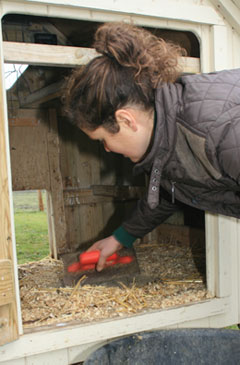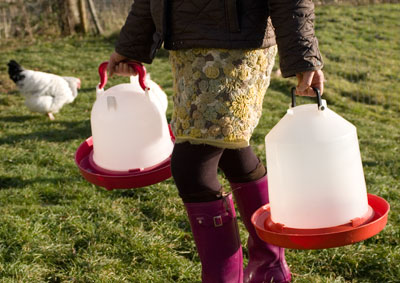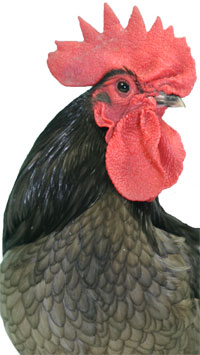Stress is a major contributor to ill health in chickens and can also make them more prone to a number of vices such as feather picking, egg eating, comb or vent pecking.
Chickens kept in intensive conditions are constantly subjected to stress which is why farmers see such high mortality rates and have to pay out to keep birds healthy and make them productive. Fortunately, keeping chickens in our back garden isn’t exactly intensive as long as they have a sufficiently large run or are let out of their run regularly to free-range although there are pleanty of other times when chickens can suffer from stress.
In short, stress is best avoided whenever possible and a little bit of care and forethought can dramatically reduce stress in your birds.
So how do we know what stresses chickens? Well, some years ago, there were studies done that measured the stress hormone ‘corticosterone’ of birds in different situations and it is this research that has enabled us to understand the stressors.
Stressors.
As well as intensive conditions causing stress, the other main stressors can seem quite trivial to us.
- Handling. This is one of the biggest stressors. Chickens are a prey species so naturally, if caught and picked up, they become stressed. Whilst regular handling is important for health checks, chasing a bird around a run for 5 minutes every time will not help. Try to catch birds in a confined area such as a house quickly and calmly. Hold the wings firmly and then transfer the bird to the holding position with your right hand underneath her, breast in the palm of your hand, fingers holding the tops of the legs. Her head should be underneath your arm so her head is looking behind you. Use your left hand to examine her.
- Introducing new chickens. Chickens are flock animals that have a pecking order. It is thought the ancestors to our chickens, the Red Jungle Fowl of South East Asia use the pecking order to assist in their survival. If every bird has her place, when it comes to feeding time, each one can have her turn and they don’t have to spend precious time arguing which may alert predators to their where-abouts. Every hen knows her place in the pecking order and by introducing new birds, the pecking order is upset. No hen knows where she stands and this will cause arguments and considerable stress for days until they have sorted themselves out into a ‘new flock’.
- Lack of food or water. This stress is completely avoidable of course but we all have those one off days when we suddenly realise that our birds have run out of water for one reason or another. A leaky water container, frozen water or just a forgetful moment!
- Extreme heat. Chickens don’t sweat. To cool down, a chicken must either take on cool water (and excrete more to lose the excess fluids and some heat) or pant which removes heat through the air they exhale. Chickens are much better equipped to deal with the cold and can keep their body temperature up by eating more and trapping air inside their feathers to insulate themselves thermally. Heat will cause chickens to become stressed.
- A new environment. This can be taking a bird to a show, getting your birds for the first time or just moving them to a different house or run. Another environmental change that is hard to avoid but causes considerable stress for your birds is when there has been a covering of snow.
- Egg laying. This is surprising since this is a natural things that chickens do but egg laying does cause stress on your hens. Giving them a peaceful, private, darkened nest box can help. Try not to disturb hens that are in the process of laying.
- Predation. Foxes or other predators visiting the garden on a regular basis are likely to cause stress. In the extreme case, after a fox attack, even though a chicken may survive the wounds inflicted by a fox (he grabs a mouth full of her feathers for example and the chicken escapes), she can still die because of the stress.

If you can minimise stress, your birds will be less prone to picking up disease which is something we would all like: happy, healthy chickens!






Can anyone help we have five chickens and they seem to be scared of going up one end of the run any answers
Odd for sure. Without more detail, I’m not sure what to suggest.
Is it open (they could be scared of a predator if for example there was a bird of prey that had dropped in – Sparrow Hawks for example)
Any holes (rat holes) again, they will get scared if a rat has popped its head out.
Or they are just new and will settle in?
I can’t think of any other reasons without more details.. sorry.
My chickens have become depressed and are pecking one another. Would this be caused because they were free range and recently have been built a large run to stay in? They have adequate roosting/nesting area. We also have a rooster.
Yes, they could be bored, or, there are just too many in a small area and they can’t keep their (social!) distance from one another.
I would try putting multiple feeding points (this removes competition for food) and hang greens in nets around the run and put a scratching area (e.g. hardwood chippings) down. Rake a little mixed corn into this every morning.
This gives them something else to do during the day.